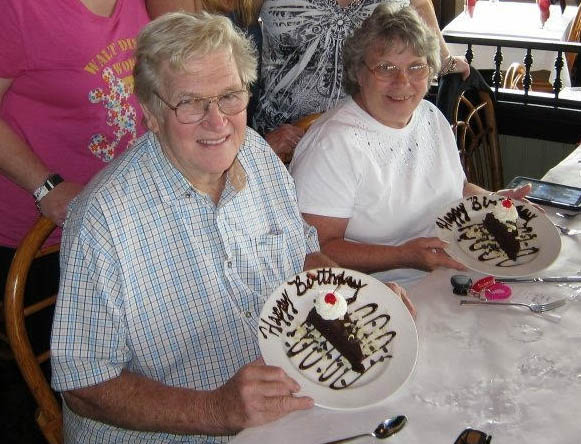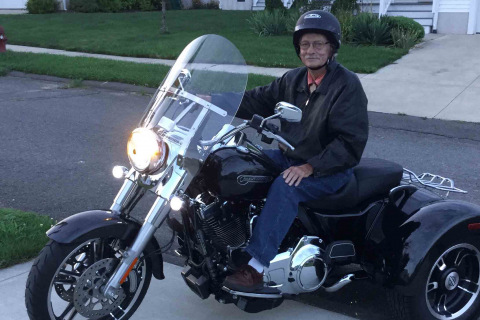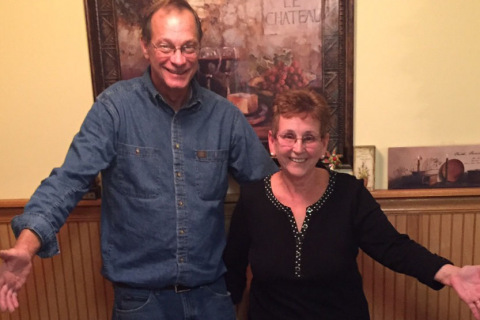Don’t Stop Living: Mantra for Six-Year Mesothelioma Survivor

Fact Checked | Written by: Tim Povtak | Last Update: 10/25/2024 | 6 Min Read
Mesothelioma survivor Don Berlin just doesn’t sit very well, living instead by the words of wisdom his doctor said two days after his aggressive surgery — “Don’t stop living.”
He never has.
Two weeks after his surgery, Berlin flew from his home in northeast Ohio to Las Vegas, where he drove a rented car another three hours to attend his oldest grandson’s wedding in California.
Six years later, he and wife Sharon were buying a small, fixer-upper winter home on a lake in Central Florida. The house came with a dock for his boat and a list of chores that could take a decade to finish.
Activity between the flying and buying was much the same: Planning, plotting, starting or finishing one job or another adventure.
“Don’t stop living.”
Berlin will turn 80 in December, and he’s planning a future well beyond the norm for a mesothelioma patient. It’s already been quite a ride.
“He’s always been a workaholic,” Sharon said. “The mesothelioma hasn’t changed that. He works much slower, at a slower pace, and that frustrates him, aggravates him to no end because it takes him so long. But come hell or high water, he still gets those jobs done. He just refuses to sit still very long.”
“Don’t Stop Living,” keeps ringing in his ears.

Don Berlin and his wife Sharon on their dock in Central Florida.
A Career as a Maintenance Painter
Berlin worked as a maintenance painter at a General Motors plant in Ohio. He spent his days off tending to the family’s four-acre homestead, where something always needed done — and he loved it.
Retirement meant packing up each winter and traveling to Florida in the family RV, where the almost maintenance-free lifestyle drove him crazy. While packing for that trip in 2009, he realized something was wrong. He was out of breath much too quickly. The dry cough and chest tightness were puzzling.
One doctor visit led to another and another. Finally, a battery of tests resulted in his malignant pleural mesothelioma diagnosis. They never went to Florida that winter. Instead, they traveled to New York where a team of specialists performed the aggressive pleurectomy/decortication surgery in February.
He did six months of chemotherapy in 2010, but he scheduled it around the Alaskan cruise he had promised Sharon and his three adult children. Daughter Cindy remembers the painful dry heaves and other chemotherapy side effects, but she also remembers her father rarely stopping to acknowledge them.
“I think at the very beginning, shortly after surgery, he was feeling down, but my older sister, who always says what she thinks, just told him ‘get your butt up out of bed, and don’t stop living,’” Cindy said. “I think it was good reminder for him. Now he’s talking about going back to Alaska again.”
Still a Busy Man
Berlin was painting patio furniture at his Florida home in June when the phone rang. A stranger wanted to talk about his diagnosis.
“I’m a little busy right now,” he politely told the caller. “Actually, I’m always busy. But I guess we can talk. I can take a break. We just have a lot of work to do around here.”
While his son-in-law took on much of the heavy remodeling work — tearing out the carpet, replacing a door and gutting the kitchen — Berlin worked alongside him laying the patio tile, building the backyard shed and painting the walls.
“He does more than he should be doing. We know that, but you can’t tell him,” Sharon said. “You just can’t keep him down very long. He complains about how long it takes him now to do things, and some things he can’t do anymore, but we all know how lucky we’ve been.”
Don’t stop living.
Berlin never had the radiation treatments doctors initially suggested. His last chemotherapy was in 2010. He used to go for checkups every three months, then every six months, then every year. The last time he went to the Moffitt Cancer Center in Tampa for a CT scans, the doctors told him there was no need to return. The cancer never has grown again.
“They told me, something else would probably get me eventually before this [mesothelioma],” he said. “I’ve been very lucky. I’ve done a lot of praying, too. I’ve never really had to change my lifestyle too much. Being active must be helping.”
Mesothelioma Changed His Perspective
Doctors told Berlin in 2009 that it was unlikely he would live another two years regardless of the treatment he chose. It initially stunned him. Then it scared him.
His family support, though, was critical. All three daughters and his wife accompanied him to New York for surgery. Cindy and her sisters started wearing mesothelioma awareness wristbands to show their support.
“I’ve always feared cancer. Everybody does. Then you become a partner of it, and your perspective changes,” he said. “Before, I’d see everyone else had problems and just think, ‘that’s too bad.’ Now I’m a lot more sympathetic. And I sure have a lot of respect for people who really fight it.”
Berlin also was diagnosed with chronic obstructive pulmonary disease (COPD), but he has learned to live with it, slowing his pace but hardly stopping him.
He had knee replacement surgery in 2014, an operation he dismissed years earlier after being told he would never survive mesothelioma. He also bought his pontoon boat that year, confident he would have the time and the energy to enjoy it.
Lost Friend to Same Disease
Berlin and his wife traveled to Washington for another grandson’s wedding in 2015. He made it quite the family affair by using the occasion to celebrate his 50th wedding anniversary with Sharon and Cindy’s 25th wedding anniversary.

Grandson’s wedding also celebrated Berlin’s 50th wedding anniversary and his daughter’s 25th wedding anniversary.
More than anyone, he understands how fortunate he has been. Mesothelioma is a relatively rare and aggressive cancer caused by exposure to asbestos. A diagnosis typically comes with a prognosis of 6-18 months.
A co-worker and friend who retired to South Carolina also was diagnosed with pleural mesothelioma less than a year after Berlin’s diagnosis. That friend died in less than six months, hitting him close to home.
“I don’t know why the cards were dealt this way,’’ he said. “I certainly wasn’t happy about it, but I’ve tried my best to keep going and not change much. And I was given some pretty good advice.”
Don’t stop living.





